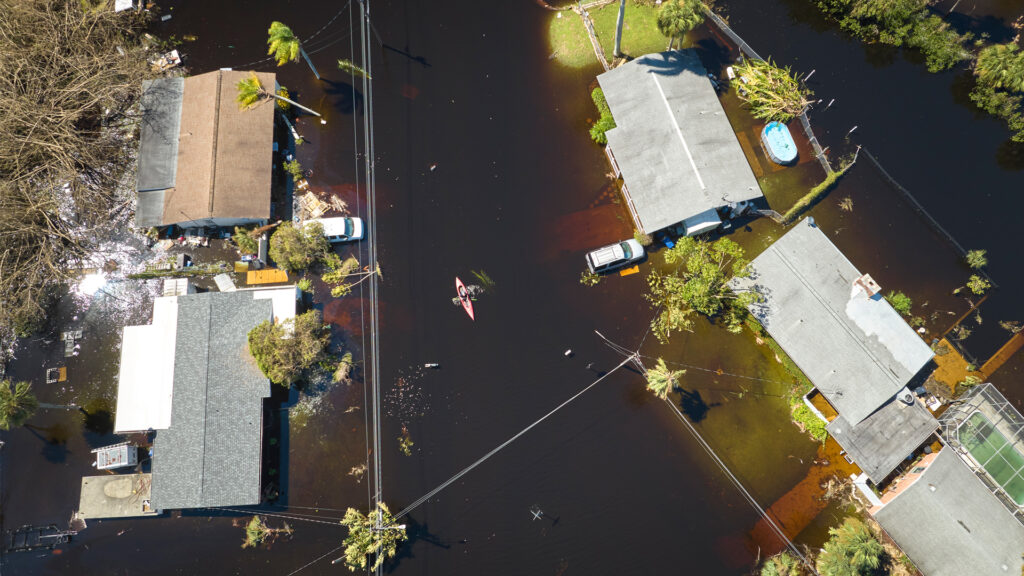By the Palm Beach Post Editorial Board
It’s an unsettling routine many Florida property owners know all too well: Property insurers either raising premiums to exorbitant and unaffordable rates or dropping customers like a bad habit. It’s no longer a problem confined to the Sunshine State, though. Unfortunately, our elected officials in Washington have failed to keep up with the trend.
Whether it’s wildfires in Arizona and Oregon; tornadoes in Kansas and Oklahoma; hurricanes in North Carolina, Virginia and, of course, Florida; extreme weather fueled by a changing climate is changing the nation’s actuarial landscape — and not to the policyholder’s advantage. Congress has kept its head in the sand long enough. Now it must give urgent consideration to a federal role in providing storm coverage.
The idea of the feds overseeing stand-alone windstorm and other extreme-weather coverage is nothing new. It’s just a concept that’s fallen from favor, and even from view. In its place, any help to frustrated homeowners has fallen to the states, leaving consumers more than ever at the mercy of the insurance industry.

One in 13 homeowners across the U.S. is uninsured, according to a recent study by the Consumer Federation of America. That number is expected to grow. Florida, a seasonal target of hurricanes, used to be the insurance industry standard for of walling off risks and letting locals resolve their problems. The effects of a warming climate have changed all that. There are only so many proverbial “walls” that the industry can build.
A larger swath of American homeowners struggles to find affordable property insurance. Residents in a growing number of “high-risk” states are facing higher premiums and larger deductibles, and they’re the lucky ones. A dreaded non-renewal letter forces many other homeowners to look elsewhere for coverage or “go bare,” doing without property insurance altogether.
Insurers are pulling out of California, a state that has seen 137 wildfires this year alone. Non-renewal notices and premium hikes are surging in Arizona, Nevada and Washington due to the growing number of wildfires. In North Carolina, state officials had proposed a 42% rate increase in homeowner insurance that was rejected by the state’s insurance commissioner as “excessive and unfairly discriminatory.” Last year, state lawmakers in Colorado set up a state-backed “insurer of last resort,” joining Florida and two dozen other states that have set up similar agencies to provide a semblance of affordable coverage.
Florida no role model for coverage
Been there, done that in Florida. Big losses from years of storms have scared off most big-name insurance firms from writing property insurance here. In their place sits Citizens Property Insurance, and a slew of smaller firms that are more susceptible to the costs of inflation, natural disasters and higher reinsurance rates. Citizens, Florida’s supposed “insurer of last resort,” has become the state’s largest carrier. Right now, it is in the midst of both dropping customers and sending them to more expensive private firms, and a congressional probe into its solvency.
Worse, there’s a growing recognition that state efforts to help curb insurance costs haven’t worked. For years, the industry has bemoaned lawsuits and bad actors as the primary reason for high insurance rates in the Sunshine State. Florida officials complied by largely tamping down efforts to legally seek redress on insurers that were unresponsive to claims and offering the industry money to help firms cover their own re-insurance costs to provide coverage.
The impact of climate change was largely left unsaid by the industry and probably would have fallen on deaf ears anyway. Florida is scheduled to repeal a 16-year-old law that lists climate change as a priority when making energy policy decisions. The bill, awaiting Gov. Ron DeSantis’ signature, would strip the term “climate change” from much of state law. For a state that’s seen to be the most vulnerable to extreme weather, the change is, well, ludicrous.
If Florida and the alarming property insurance trends nationwide are any indication, homeowners seeking affordable property insurance shouldn’t expect much help from state governments alone. Federal intervention is essential, whether in requiring better data to assess coverage needs or in considering a program similar to the current National Flood Insurance. Congress has its share of difficult and intractable issues. Add property insurance to the list. But must we wait for a climate disaster to expect our representatives to act?
This opinion piece was originally published by the Palm Beach Post, which is a media partner of The Invading Sea.
If you are interested in submitting an opinion piece to The Invading Sea, email Editor Nathan Crabbe at ncrabbe@fau.edu. Sign up for The Invading Sea newsletter by visiting here.




If what DeSantis and the previous Governor Scott have done so far regarding climate change in Florida, we can count on no help from them and maybe interference with any federal solutions. DeSantis apparently doesn’t believe in taking any federal aid or advice.